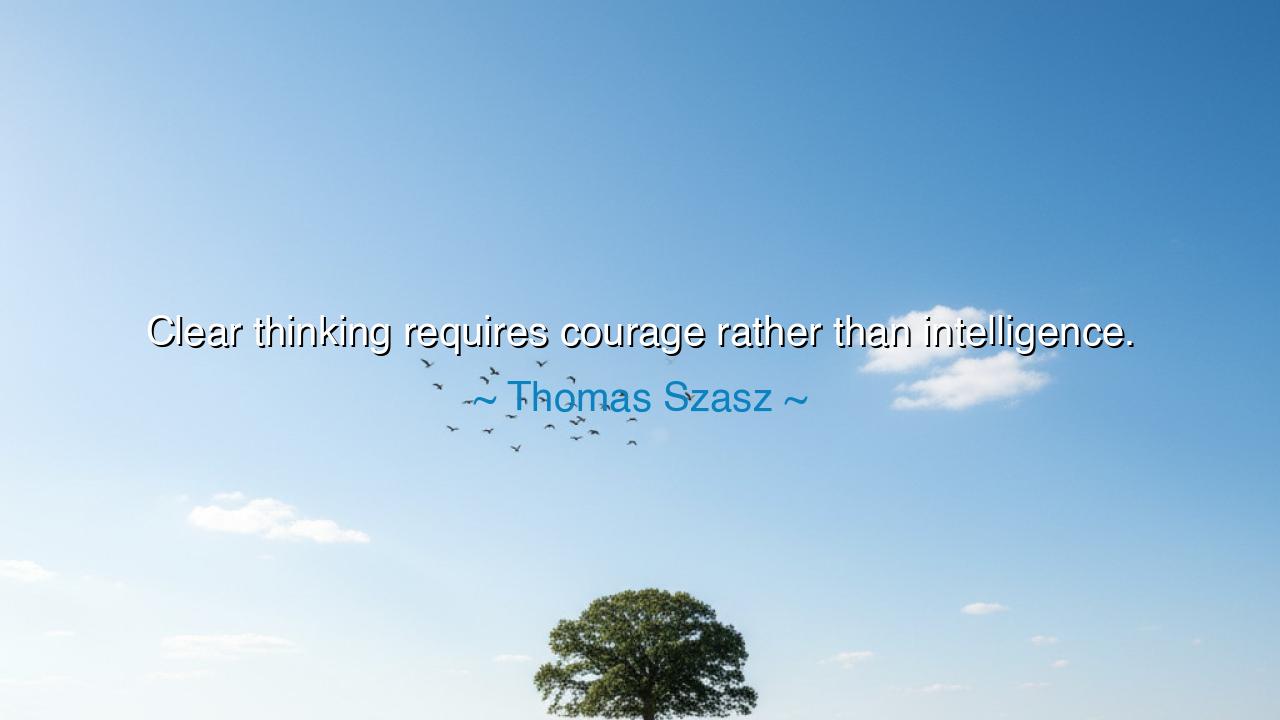
Clear thinking requires courage rather than intelligence.






“Clear thinking requires courage rather than intelligence.” Thus spoke Thomas Szasz, a man who saw into the hidden corners of the mind, and who dared to challenge the assumptions of his age. His words cut through the illusions that often surround intellect, revealing that wisdom is not born from brilliance alone, but from bravery — the willingness to see truth even when it terrifies us. For clarity of thought is not the work of cleverness, but of courage: the courage to question what is comfortable, to confront what is forbidden, and to stand alone in the light of understanding when others prefer the shadows of conformity.
In the ancient world, philosophers taught that the first duty of the mind was to seek truth. Yet they also knew that truth is rarely gentle. It exposes vanity, overturns dogma, and demands sacrifice. The Greek sage Socrates embodied this truth. He was not the most learned of his time — he claimed to know nothing — but he possessed the greatest courage of thought. When his city condemned him for corrupting the youth, he refused to renounce his questioning. He drank the hemlock calmly, proving that clear thinking, in its purest form, is an act of moral bravery. He was not killed for ignorance, but for insight — for daring to think beyond the comfort of the crowd.
Thomas Szasz, himself a psychiatrist and thinker, spoke these words in defiance of his own era’s false certainties. He challenged the medical establishment, arguing that not all madness was illness, and that labeling dissent or despair as disease could become a tool of control. In saying that courage is greater than intelligence, he revealed a truth that applies to every age: the intellect may gather facts, but only courage can face what those facts mean. A coward may possess genius but will twist it into illusion rather than accept a truth that disrupts his comfort. Only the brave can see the world as it is — and not as they wish it to be.
This balance between truth and fear has shaped every turning point in human history. Consider the story of Galileo Galilei, who stood before the Church and dared to declare that the Earth moved around the Sun. The evidence was clear to him, yet to speak it aloud demanded immense courage. His contemporaries, no less intelligent, refused to see — not because they lacked reason, but because they lacked bravery. Intelligence builds the telescope; courage dares to look through it. In Galileo’s steadfastness, we see Szasz’s words fulfilled: clear thinking requires courage first, and brilliance only second.
To think clearly is to strip away illusion — and the greatest illusions are often those we love. We deceive ourselves not out of ignorance, but out of fear: fear of loss, of change, of truth’s demand. To face reality as it is — not softened by hope nor blurred by denial — is one of the most painful acts a human can endure. Yet it is also the most liberating. The one who sees clearly, though surrounded by confusion, becomes like a mountain unmoved by fog. He is free not because he knows more, but because he dares more.
The ancients said that courage is the root of all virtue, for without it, no virtue can act. So too with thought: without courage, the mind becomes a servant of its fears. The cowardly intellect invents excuses for injustice, cloaks falsehood in eloquence, and calls ignorance peace. But the courageous mind, however humble, sees and speaks truth even at great cost. Such minds are the torchbearers of progress — the prophets, the scientists, the reformers, and the quiet souls who refuse to believe what they know is wrong.
Let this, then, be the lesson for those who seek wisdom: do not worship intelligence — cultivate courage. Intelligence without courage becomes deceit; courage without intelligence becomes folly. But when the two are joined, truth is born. To think clearly, you must dare to doubt, to question even your own heart. You must be willing to lose the safety of certainty for the clarity of understanding.
So remember Thomas Szasz’s words as both a challenge and a blessing: “Clear thinking requires courage rather than intelligence.” Let your thoughts be brave — brave enough to face reality, to confront falsehood, to embrace change, and to admit when you are wrong. For in the end, the mind that fears nothing will see everything, and the soul that thinks bravely will live freely.






AAdministratorAdministrator
Welcome, honored guests. Please leave a comment, we will respond soon